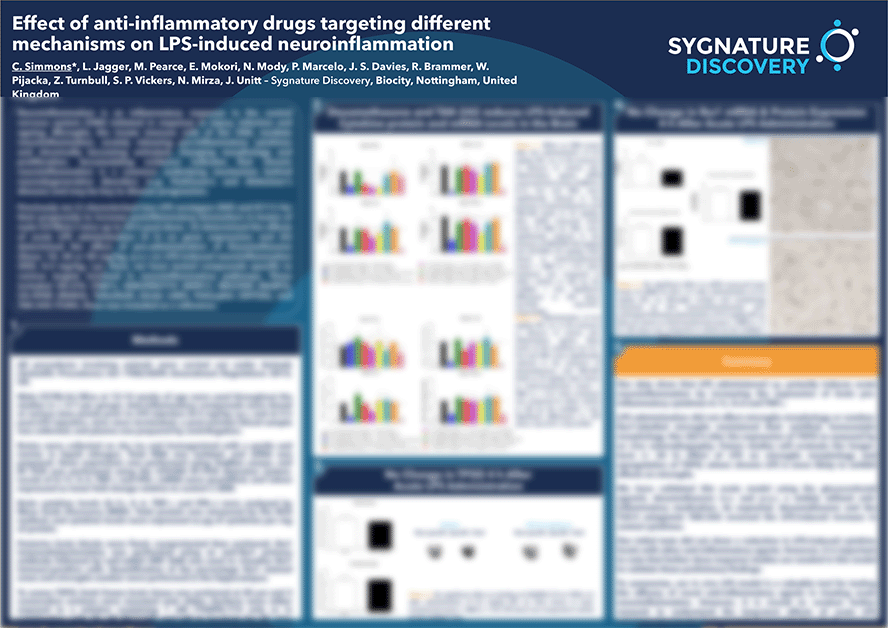Effects of compound targeting different mechanisms on LPS-induced neuroinflammation
Accumulating evidence indicates that neuroinflammation is a common underlying mechanism behind neurodegenerative disorders (e.g. Parkinson’s and Alzheimer’s disease) and might be key to disease progression. Lipopolysaccharide (LPS) is a potent endotoxin used to model aspects of neuroinflammation.
Previously we (i) characterized two LPS serotypes (055 and 0111) for their propensity to increase proinflammatory biomarkers in brains of male C57BL6/J mice up to 24h post-dose; (ii) determined the effects of acute LPS administration (4h) on gene expression; and (iii) determined the effect of pre-administration of Dexamethasone (Dexa: 10, 30 or 50 mg/kg, p.o.) on LPS-induced neuroinflammation (055, 0.3 mg/kg, i.p). Here, we have tested compounds specific to various targets involved in neuroinflammatory pathways. These included HS-276 (TAK1), GSK2982772 (RIPK1), MCC950 (NLRP3), CA-4948 (IRAK4), Tofacitinib citrate (JAK), Psilocybin (5HT2A), and TAK-242 (TLR4). Dexa was included as a reference.
Each compound was dosed at a suitable time before LPS injection, and at 4h post-LPS injection mice were terminated, a post-mortem blood sample collected and centrifuged for plasma. Whole brains were collected on dry ice and homogenized with a pestle and mortar in liquid nitrogen. Gene expression was performed using TaqMan assays, with RT‑PCR performed using the CFX384 RT‐PCR detection system. Levels of IL-1β, IL‑6, TNF-α and IFN-γ mRNA were quantified, and values expressed as mean fold change relative to control ± SEM; n = 10-12 per group. Protein expression levels of these cytokines were also analysed using the MSD multiplex system.
TAK-242 (10 mg/kg, ip) significantly reduced mRNA and protein expression of IL‑1β, IL-6 and TNF-α compared to LPS-treated mice (p<0.001 compared to LPS only group for all three cytokines). Dexa was included as a reference (10mg/kg, po) and significantly reduced LPS induced mRNA and protein expression of IL1-β, IL-6 and TNF-α, as seen in our previous study. Expression of IFN-γ mRNA or protein was not increased significantly by LPS and therefore there was no induced response to be ameliorated. All other compounds tested did not reduce levels of cytokine mRNA or protein expression induced by LPS.
Our data show that TAK-242 inhibits the LPS-induced increase in cytokine mRNA and protein expression in a similar manner to Dexa. TAK-242 is a TLR4 inhibitor which is a known receptor for LPS so this response further validates this in vivo LPS model as a useful approach for testing the efficacy of novel anti-inflammatory agents against neuroinflammation but may only be useful for agents either targeting TLR-4 or its immediate downstream components.

